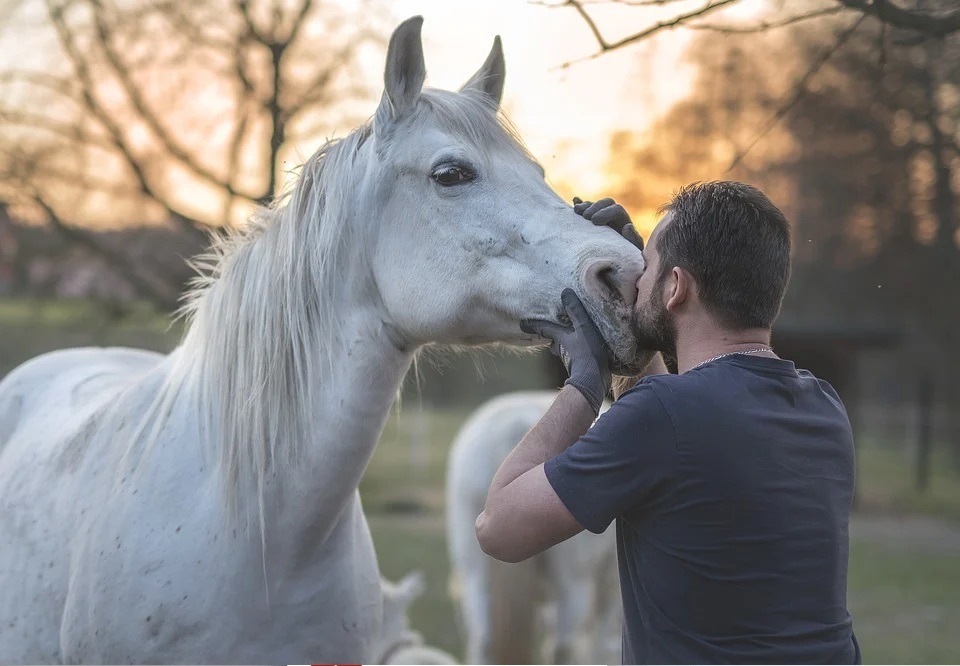Besides being known for their majestic physical prowess, horses are also known for being very skittish. Like humans, horses also get an anxiety attack and become overwhelmed. This occurs mainly when they see a change in the environment or when there is a slight change in routine. Sometimes, there is no explanation at all.
As a horse rider and caretaker, it is an essential skill to calm your horse down. Horses go berserk once their anxiety goes off the rails. To avoid any accident or chaos, you need to pacify your horse. Here are 14 simple tips on how to calm your horse.
Keep Your Composure
Do not freak out when your horses are experiencing a nervous breakdown. Horses are very perceptive and can pick up your emotions. They will get more scared when they sense their rider is also anxious.
The last thing you want would be aggravating the situation by panicking. So, always remain calm around your horse at all costs.
Breathe Steadily
Control your breathing when you are with your horse. Breathe steadily. People are more likely to hold their breath when their horse gets stressed. This adds on to the stress and will worsen the circumstances. Do not hold your breath around your horse, just loosen up and ease yourself physically.
Look for the Cause
Investigate the surroundings and look for the root of the horse’s fear. It might be a kite stuck in a tree or the horse needing time to adjust to the new routine.
Whatever the cause is, once you can assess the situation, you can determine a way to remove the cause. Removing or dealing with the cause would make your horse calm.
Talk to Your Horse Gently
When your horse gets tensed, soothe them by talking to them. Talk to them in a gentle, steady, and low voice. Provide them with the assurance that everything is alright.
The horse gets comfort from your reassurance and also diverts its attention to you away from its fear.
Tread Slowly
You might get the urge to unharness your horse or act fast to come up with a prompt solution. Do NOT act or move quickly when you encounter a scared horse.
The quick movement might cause your horse to overreact and worsen the circumstances. When you are around your worried horse, always move slowly. Do not make any sudden movements. Let them know and see you are with them.
Inspector Horse
When you find the object that is causing your horse’s distress, allow the horse to examine it. This way, the horse can find out that the object is not threatening. Your horse will then be able to calm down, and you can get back to whatever you were doing.
Train Your Horse
Train your horse to lower its head at your cue. When your horse is nervous, you can ask your horse to lower its head so that it can refocus. Letting the horse’s head down would give it some relief and can shift its attention to you.
Practice lowering your horse’s head at your request regularly. This will improve communication and will waste no time when you are trying to comfort your horse.
Exercise Your Patience
Always be patient with your horse. Your horse is very sensitive, and if by any chance, it can sense your impatience and stress, it will definitely lose control and have a fit.
Let your horse take its time to process the situation. Do everything with care and time.
Make Your Horse Work
Gently persuade your horse to work or continue your activity. The work will distract the horse from its anxiety.
To make your horse pay attention to you and get back to work, make it trot in circles or doing leg yields. When it gets settled, you can finish your task and reward your horse with a treat afterward.
Regular Checkup
Regularly examine your horse. It might be suffering from a physical issue or disease which is making it more prone to getting tense.
Most horses suffer from temporary blindness. So, it is strongly advised to regularly check your horses. This will help you get the treatment immediately for your horse. Approach a vet or animal doctor for the overall checkup and treatment.
Supplements
Equine nutrition is crucial, especially for de-stressing your horse. Some supplements help in calming horses down. These are specifically designed to comfort your horse and provide its nourishment simultaneously.
Do Not Make a Mountain Out of a Molehill
Avoid overreacting or making the situation a big deal. When the horse sees you emphasizing its anxiousness, it will definitely prove to the horse that it is in danger.
This will affirm its fears and will make the situation go out of control.
Be Attentive to Your Horse
Pay attention to your horse. Keep track of the state of your horse so that you can immediately notice any change in its behavior. When you can detect any anomaly, you can come up quickly with a solution. This will help you to be cautious and prevent any unsavory encounters.
Study Your Horse’s Personality
Horses and humans have a common ground. Both of these species have their own unique personalities. Horses also have individual traits and quirks.
Studying your horse’s personality will help you understand it better. Acknowledging its likes, dislikes, and fears will help you build a proper relationship with your horse. The stronger the relationship with your horse, the easier it is to keep your horse under control.
Being able to read your horse’s body language will help you in the long run. It will make you wary when you sense that your horse is acting differently.
Being prepared and able to take care of your horse is important. Pacifying your horse is one of your major responsibilities. We hope our suggestions can help you handle this responsibility well.
